By Mark McGee
Stephen B. (Steve) Smith lives a life of superlatives. A man of many facets, he not only succeeds, but puts an exclamation point on all of his efforts.
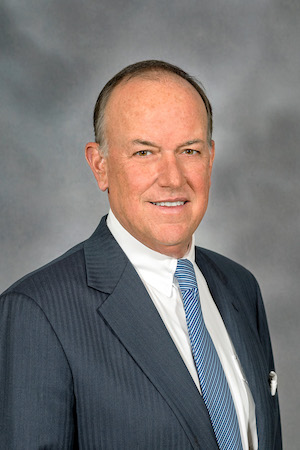
This summer he was named to the 2023 class of the Tennessee Sports Hall of Fame, his third such honor. In 2004, he was inducted into the Blue Raider Hall of Fame at MTSU. In 2001, he was honored as a member of the Tennessee Walking Horse National Celebration Hall of Fame. His father, Reese Smith, Jr., is also a member of the Tennessee Sports Hall of Fame and the Tennessee Walking Horse National Celebration Hall of Fame.
Steve was informed of his selection prior to the tip-off of a women’s basketball game with UAB at the Murphy Center. MTSU President, Dr. Sidney McPhee; athletic director, Chris Massaro and coach of the Lady Raiders, Rick Insell (who is also a member of the Tennessee Sports Hall of Fame) were on hand for the announcement.
“Stephen Smith’s connection to Middle Tennessee covers the last six decades from his time at Battle Ground Academy (where he was a three-sport athlete), to MTSU, to the Tennessee Walking Horse industry. Stephen has made an impact throughout his life,” said Brad Willis, Executive Director of the Tennessee Sports Hall of Fame. “To this day, he continues to contribute his time and efforts to athletics, and we are thrilled to honor him as part of our 2023 Class.”
His 150 guests, representing all areas of his life, were present at the Omni Hotel for the ceremony.
Wayne Huizenga, businessman and professional sports team owner, is quoted as saying, “Some people dream of success, while other people get up every morning and make it happen.”
Steve, chairman of Haury & Smith Contractors, doesn’t miss a day making things happen.
Blue Raider proud
Of all his accomplishments Steve rates his work with his alma mater as the crown jewel of his efforts.
He serves as Chairman of the inaugural MTSU Board of Trustees and is excited about both the present and the future of the university.
In 2014, Steve was honored by MTSU with its Distinguished Alumni Award. In 2010, he was presented the Jennings A. Jones Champion of Free Enterprise Award. His involvement in MTSU goes back decades beginning with his time as a baseball player in the 1970s.
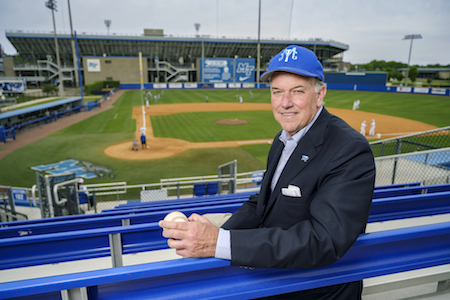
“I didn’t graduate until I was almost 60 in 2011,” Steve said. “We are a blue-collar school. We are training people to make a living.
“The average age of our students is 26. We have liberal arts, but we started as a teacher’s college. We are training teachers, nurses, airline pilots, concrete management and accountants.”
Steve appreciated what he learned from John Stanford, his baseball coach, as well as his teachers at MTSU. They gave him confidence and he has the same belief about the university.
“I have confidence in MTSU,” Steve said. “We are going to spend $100 million to train pilots and airplane mechanics in Shelbyville. That is a project that didn’t just happen.”
Steve stresses his only concern is MTSU and that is why the board, established in 2016, is so important.
“MTSU had never had a board,” Steve said. “Governor Bill Haslam asked me to be on the first board and they elected me chairman. I have been chairman since its inception.
“We have had some amazing accomplishments. Some of them wouldn’t have happened without the board. We are the largest undergrad school in the state, but what I am most proud of is we have the highest athletic graduation rate in the state. If they don’t want a degree, we don’t want them.”
He was a leader in helping MTSU construct the first lighted college baseball stadium in Tennessee. The new baseball clubhouse is named in his honor. He helped found the Blue Raider Athletic Association and through his leadership with the board of trustees he is leading the effort to add $100 million in athletic improvements on campus.
Love of walking horses
Steve and his father, Reese, Jr., were both enthusiastic riders, but they didn’t make an overnight plunge into show ring success.“We had a pony and Pops had a gaited horse, but I am sure it wasn’t registered,” Steve said. “We went to the Krystal on Saturday mornings. I had a chocolate doughnut and chocolate milk, and Pops had a waffle. We went to the hardware store. Then we went to the farm and rode our horses and shot a box of .22 shells and still made it home most of the time to go to Varallo’s for lunch at the split between Highways 100 and 70.”
Steve and his parents made trips to the Tennessee Walking Horse National Celebration for many years, but neither Steve nor Reese, Jr., contemplated the possibility of showing in “the big ring.”
“I think my mother and dad may have gone to the first Celebration (in 1939) at the Shelbyville High School field or some of the earlier ones,” Steve said. “My earliest memory is that at seven or eight years old I went with my mother’s parents. They had grandstand seats for Thursday, Friday and Saturday nights. I went to sleep at my first Celebration.
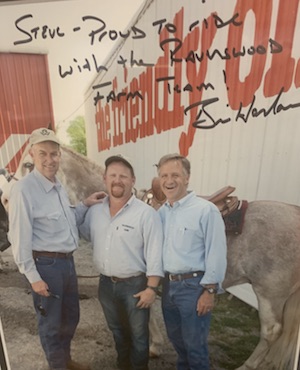
“It never entered my mind or my Dad’s that we would ever have a horse in the Celebration. It was never an aspiration. It seemed like an unreachable financial commitment.”
When he was 11 the Smiths paid $300 for a Tennessee Walking Horse stallion at a dispersal sale and placed him in training.
He rode that stallion in pleasure classes, but left the show ring for several years as baseball dominated his spare time. He would not return to the show ring until he was 24. Success did not come easy.
“I didn’t win a blue ribbon at any show until I was in my late 20s or early 30s,” Steve said.
Ironically, his father would have a riding suit before he had a show horse.
“I went to National Bridle Shop in Lewisburg in my mid-20s to buy a custom-made riding suit,” Steve said. “There were two suits that had been made for a trainer who never picked them up. I asked Bobby Beech if he could alter them for my Dad and me.”
Reese Jr. bought his first show horse, Ebony’s Aristocrat, from trainer Wallace Brandon, starting a longtime relationship between them.
“It was the best buy of a Tennessee Walking Horse that there has ever been,” Steve said. “Wallace trained him with pads, but without an action device. They showed every weekend. Dad had more than 100 ribbons.”
Reese Jr. was hooked, and the family became a key part of the Tennessee Walking Horse industry, eventually establishing a showplace training barn at Ravenswood Farm in Franklin.
“It snowballed from there,” Steve said. “Dad would buy a farm and then another farm. His golf game in Florida was a walking horse barn. He just wanted to have a horse he could win with. He would rather have had one good show horse than 10 broodmares.
“We bought a Winnebago and we showed together. I liked being with him and he liked being with me. It was always a family thing.”
As a rider, Steve has 10 world championships to his credit from 1985 to 1993, many aboard the black mare Miss Walking Miracle. The team won the Owner-Amateur Riders on Walking Mares, Over 15.2 class in 1990, 1991 and 1992, retiring the Dr. O.B. Neely Memorial Challenge Trophy.
Also in 1992, Steve directed Miss Walking Miracle to the Owner-Amateur Riders on Walking Horses World Grand Championship.
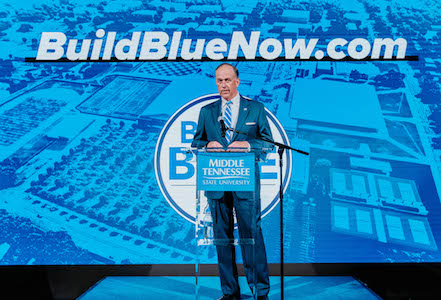
He may be more impressed, however, with two other Celebration wins by Miss Walking Miracle. His father rode Miss Walking Miracle to a Celebration blue ribbon in the Owner-Amateur Riders on Walking Horses, Riders 60 Years & Over, Specialty class in 1990. His son, Stephen, Jr., opened the 1993 Celebration with a top finish on Miss Waking Miracle in the Owner-Amateur Junior Riders on Walking Mares, Riders 11 Years & Under class.
“If there are a dozen top mares in the history of the breed, she is one of them,” Steve said. “She was a once in a lifetime mare.
“Troy Richards started her. Walt Thrailkill owned Miss Walking Miracle. His wife, Sheila, was a good rider. For whatever reason they decided to sell her in her two-year-old year.”
Steve, who also won reserve world championship honors 11 times as a rider, gives David Landrum, the Smiths’ trainer at Ravenswood, credit for much of the showring success of Miss Walking Miracle.
“She had a lot of talent and a lot of grit,” Steve said. “She was durable. I don’t ever remember her being sidelined with an injury.
“She was predictable. She just did about the same thing every time out.”
As a broodmare, she was equally as successful as the mother of Miracle At The Ritz, who Steve sold to William Johnson.
“To this day, Miracle At The Ritz is the most expensive mare to ever be sold,” Steve said. “Sandra Johnson won over and over on her. It was the best buy they ever made.
“When Mr. Johnson died, I bought her back. She has been the queen of my broodmares.”
Steve has also owned and started Ted Williams, Hallelujah’s Power Pac, Coin’s Hard Cash (the 1987 World Grand Champion) and Nationwide Pride.
Two of his other top broodmares were Pride’s Xanadu, the mother of Ted Williams, and Miss Walking Miracle.
Steve’s father set the pace in Celebration wins in the family. In 1982, 1983 and 1984, Reese, Jr., rode Ebony’s Aristocrat to the winner’s circle in the Show Pleasure Walking Horse Championship Stake to retire the P.H. Payne Memorial Challenge Trophy.
In 1987. Reese, Jr., rode Senator’s Legend to a first-place tie in the Owner-Amateur Riders on Walking Stallions, Specialty class.
Steve and his wife, Denise, are world grand championship winners in the yearling classes at the Celebration with World Grand Champion Yearling wins with All American Ritz in 2002, A Mission Impossible in 2019 and Cash Kid in 2021.
Steve has earned recognition as a Master Breeder by the TWHBEA. He has bred, foaled and raised 11 Tennessee Walking Horses who have earned a combined 32 world titles.
Steve has 16 broodmares, and usually has nine yearlings ready for showing each year. He credits Marty Warren, manager of Ravenswood Farm since 1992, for their success in halter classes.
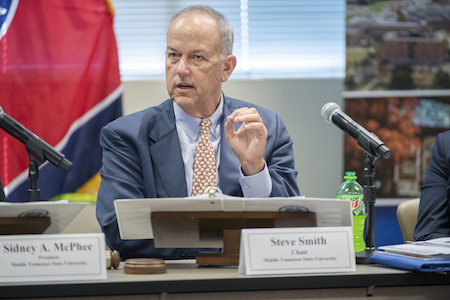
“Marty is a big part of it,” Steve said. “I think the thing that stands out is the most foals we have ever have in a year is nine or 10. And, if you want a colt that is going to win at the Celebration, we are picking from four or five. When he wins, it is a whole different game than those guys who have many more to pick from.
“We have won three times on horses nobody has touched but Marty, that we raised and picked. Marty is not a professional handler because he doesn’t take in other horses. He picks the best we have and that is what we show. He is a great horseman. He is a dedicated person.”
His involvement in the industry goes beyond the show ring. As the youngest president of the Tennessee Walking Horses Breeders’ and Exhibitors’ Association (TWHBEA), he oversaw a membership drive that increased the members’ list from 7,000 to 20,000. He served two terms as TWHBEA president and revived the Political Action Committee, led the first delegation to meet with the Secretary of Agriculture, hired the first state lobbyist for the TWHBEA and hired the first Pleasure Horse Coordinator.
During his second term, he, along with close friends Walt Chism and Charles Gleghorn, helped turn around the finances of the TWHBEA through a variety of methods to help save the headquarters building in Lewisburg from being sold.
“We took a business approach,” Steve said. “We were able to turn it around in six or eight months.”
He has also served as chairman of the National Horse Show Commission and is a member of the Walking Horse National Celebration Advisory Board.
Steve quit riding for a number of reasons. He said it was an easier decision to make after winning a world grand championship.
“There were 30 to 40 horses competing in that class,” Steve said. “There were workouts. Winning the Amateur Stake was a big deal.”
Steve became disillusioned with the manner in which the USDA was inspecting horses.
“Politics and the USDA inspections don’t mix,” Steve said. “I have never had a ticket and the only way not to get one is to not show.
“I still ride, but I do miss showing. There is no way of knowing if your horse is going to pass inspection or not. You can get the best advice in the world, but you still can’t be sure.”
Also, drawing away from the show ring was the time spent coaching his sons, Stephen, Jr., and Matthew, in baseball.
“Riding horses and coaching youth baseball are really not compatible,” Steve said. “You play every night.”
Swinging for the fences
Steve not only became an original partner in the Nashville Sounds minor league team in 1978, but before he was through, he would be a part-owner of 12 teams. He was also an original partner with the Nashville South Stars professional hockey team, which was the top farm club for the Minnesota North Stars, and helped bring professional basketball to Nashville with the Music City Jammers.
When Larry Schmittou was seeking owners for his new pro baseball venture in Nashville, he was received less than enthusiastically.
“Larry pitched it to Dad and Carl Haury to do it and said he needed $300,000,” Steve said. “Dad said he would like to see Nashville have a good amateur park to play in. He didn’t think minor league baseball would work. Everyone remembered the Nashville Vols had failed.
“There would have never been the Sounds without Larry. There has never been a harder worker, but he had no business experience. We knew he believed in his numbers, but nobody thought they were accurate.”
Even with his doubts, Reese, Jr., made the decision to invest. He was joined by partners from the country music industry and businessmen from Nashville.
“Pop said he would take three shares,” Steve said. “Conway Twitty bought four shares. There were 10 shares at $30,000 each. Behind Pop’s back my mother Marcella, Reese II and I bought a share. Pop wasn’t really pleased about that.”
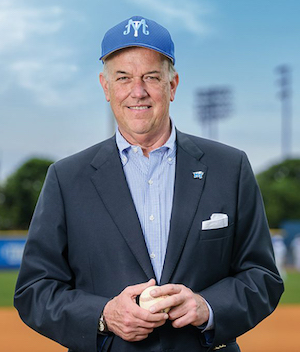
Twitty brought in some music people like Gene Smith and Jerry Reed to buy portions of the shares. Richard Sterban, of the Oak Ridge Boys, also bought in, along with some other businesspeople in Nashville like sporting goods owner Walter Nipper and Farrell Owen, as well as the Sounds first general manager.
Of all of the teams he has been a part of as an owner, the Sounds are closest to his heart. Steve has what he describes as “poignant” memories of the night when Billy Martin, former New York Yankees all-star, and later their manager, brought the team to Greer Stadium.
“It was an exhibition game,” Steve said. “The Yankees wanted to be in Nashville like you want diarrhea.”
Martin, sometimes known for his volatility, showed a much softer side of his personality to Steve and the rest of the fans in the park.
“I liked Billy Martin,” Steve said. “He was courteous and thoughtful. Two things hit me really hard as the reasons why I liked him.
“I went on the field before the game at the same time as Mr. Jim Turner who had coached the Yankees when Billy played. Billy recognized Mr. Turner and stood straight up, took is hat off and immediately asked him to come over and talk with him.”
The other reason is the patience he showed to autograph seekers, especially children.
“We had a packed house…10,000 to 12,000 people,” Steve said. “And, there were hundreds of children wanting Billy Martin’s autograph. He stood in the corner of the dugout and said `you all line up so I can see you.’ He signed every baseball and didn’t just sign them. He connected with the kids. He was selling baseball.”
Steve also was a scout for the St. Louis Cardinals and a board member of the Nashville Old Timers Baseball Association. He was named “Mr. Baseball” by the association in 2009. He also serves on the Williamson County Sports Authority.
Once again, he is not resting on his past as an owner of minor league teams. Nashville is being mentioned as a site for one of two expansion teams for Major League Baseball. Steve is member of Music City Baseball, which is dedicated to bringing a Major League team to the area.
“We are going to have Major League baseball in Nashville,” Steve said. “Everyone wants to be in Nashville.”
Politically active
Steve and Haury & Smith Contractors have done some business with the City of Nashville. Steve has also been involved in many aspects of local government serving on the Metropolitan Nashville Planning Commission, the Regional Transit Authority and has been Chairman of the Board of Directors of Metropolitan Nashville Parks and Recreation.
He says the company has been supportive of local politicians who ask for help, but he has been most active through the years working with politicians on a national stage in U.S. Senate and Presidential runs.
“As a family we have been politically active all my life,” Steve said. “It is all about God and Country.”
When Dr. Bill Frist decided to run for the United States Senate, Steve served as National Finance Chairman for Frist’s leadership committee.
“Bill Frist is my best pal,” Steve said. “He had been president of Delta Sigma, my high school fraternity.
“When he got involved in politics, I ended up being his finance chairman. I was also his finance chairman for two years as he decided to run for President, but he had enough sense to know it was time for a Democrat to win and he ended his campaign.”
Lamar Alexander decided he wanted to run for the United State Senate in 2002, winning in 2003.
“We were on a hunting trip together,” Steve said. “Lamar asked me if I do this (run for the Senate) will you run the finances? I said ‘yes.’ I was his finance chairman for all three terms.”

He also served as one of Alexander’s finance chairmen when he ran for President in 1996 and 2000.
Six years ago, Marsha Blackburn asked Steve to join with Jim Haslam II, father of former Tennessee Governor Bill Haslam, to serve as her Senate finance chairmen. Steve was Bill Haslam’s campaign chairman and also was U.S. Senator Bill Hagerty’s state finance chairman.
“Being a finance chairman is a lot of work,” Steve said. “It is for God and Country. You hope you help change lives by doing it. I see it as a public service.”
Never tell him never
Going back to his college days as a baseball player, he was in a wreck in 1976 sustaining injuries so severe doctors told him he probably would not walk again. Not only was he able to walk within months, he was back on the mound for the MTSU Blue Raiders in a few months and helped lead the team to the Western Division OVC Championship in 1977.
“I have no memory of when I learned to pitch and catch,” Steve said. “I didn’t take any lessons. I had a father who played fast pitch softball. It was part of my life. Reese III and Mark, my brothers were excellent players. They were better athletes than me. We played in the back yard.”
Steve struggled with his control as a pitcher, but he worked on it and was effective. He played high school ball at BGA, for the Nashville Merchants travel team and one year at Lipscomb University before he transferred to MTSU.
“My first year at MTSU was John Stanford’s first year as coach,” Steve said. “He came to MTSU from Shelbyville Central High School. Coming to MTSU was one of three or four best things that ever happened to me. I wouldn’t be chairman of MTSU if it hadn’t happened.
“Going from NAIA to NCAA I had to sit out a year. Having a redshirt year was really tough. You had to practice and run the same number of sprints.”
The car wreck made his career even more challenging.
“I dislocated both of my hips and had a compound fracture of my right wrist,” Steve said. “I wasn’t sure if I would be able to use a glove.
“It was August 6. It was a hot day. Mark and I had been mowing yards and a truck ran into us.”
Dr. Pinkie Lipscomb, a renowned surgeon specializing in sports injuries, worked a St. Thomas Hospital where the ambulance brought Steve to the emergency room.
“I had been working all day,” Steve said. “I had grass all over me. I was really thinking more about getting some cool air.
“I had broken my left hip. I needed stitches in three or four places. I had pins in my knee. I was in traction. I went from 210 to 150 pounds.”
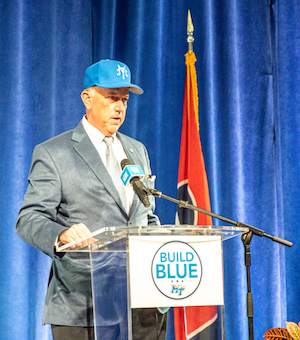
Dr. Lipscomb told him he would have to decide what his baseball future would be. Fear and motivation were the incentives.
“I had been laying in bed for six weeks,” Steve said. “He told me if I wanted to walk it was up to me. Smith not only walked again, but through sweat and pain he was back on the baseball field.
“I didn’t have to go to school in the fall to be eligible because I had enough hours,” Steve said. “I had 100 days to get ready for opening day against Auburn.
“It was a tough task. Murphy Center had an indoor track. The trainer gave me a key to Murphy Center. The pain was pretty tough. Many nights I would fall asleep in the whirlpool.”
He returned to the baseball field successfully in college and also for an adult league team. But there were consequences to his accident.
“It ended whatever chance I had to play on the professional level,” Steve said. “I was a pretty good college pitcher. I was a left-handed pitcher, and you can never have enough of them.”
Challenges have never deterred Steve’s determination. Perhaps Franklin D. Roosevelt, the 32nd President of the United States said it be best when he said, “Happiness lies in the joy of achievement and the thrill of creative effort.”
Based on that statement that would mean Steve Smith has to be one of the happiest people on earth.